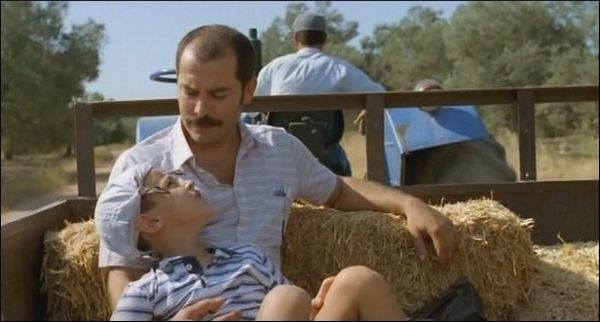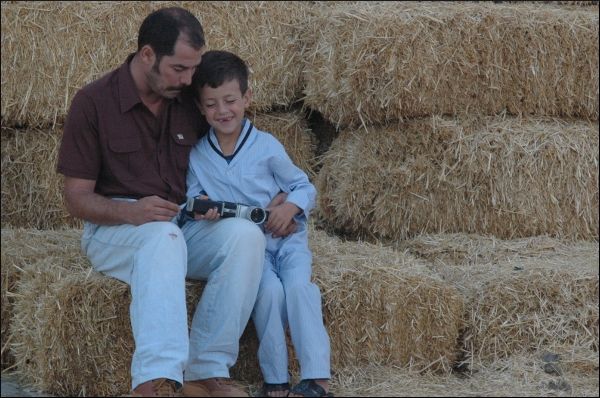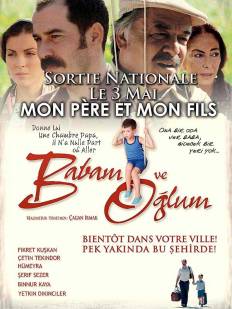In Babam ve Oglum (My Father and My Son), Sadık (Fikret Kuşkan) leaves his village in the Aegean coast of Turkey to study journalism in Istanbul. His father, Hüseyin (Çetin Tekindor), wants him to study agricultural engineering, so that one day he can manage the family firm, but Sadık wants to follow his dreams and opposes his father’s desire. He becomes a left wing activist journalist and his father disowns him.
In the morning of September 12, 1980, during the military coup, Sadık’s wife gives birth to their son Deniz (Ege Tanman) on the streets. Because of the coup, they can’t find anyone to help. The army controls everything and going outdoors is restricted after 8 PM. Thus, Sadık’s wife dies after giving birth, and shortly thereafter, Sadık is arrested, tortured, and imprisoned for three years. By this time, his health starts to deteriorate. After leaving prison, he takes his son and heads back to the village. They are welcomed by everyone, including his mother and aunt, except for his father. Sadık is very sick, but he needs to face his father and build a new life for his son Deniz in the village.
"When the movie came out in 2005, it was a big hit. Almost everyone was asking the same question: 'Did you cry?'"
The first minutes of the movie realistically portray the 1980 coup. Sadık can’t find anyone to help his wife during childbirth because of the curfew, and she dies because of blood loss. These kinds of things really happened at that time. Another reality is the torture of leftist activists in prison. Sadık is just a simple example. He’s a leftist journalist who writes his opinions, and because of his thoughts, he spends three years of his life in jail. Most of his friends don’t help him after he gets out, because they either work under army control or don’t want to be seen with a leftist. This is why Sadık decides to return to his village.

Although Hüseyin has decided to ignore Sadık, in Turkish culture, family is more important than anything else. There’s a saying in Turkish, “Baba Ocaği” (father’s house). No matter what your relationship to your father is, if you want to return to the family household, the door is always open, even if your father is not on speaking terms with you. In the situation shown in the film, we also see the important role that mothers play in Turkish families. Sadık’s mother, Nuran (Hümeyra), takes his son back home and convinces her husband to forgive him. In Turkey, if a mother wants something done within the family, it gets done. Day by day, step by step, Sadık’s relationship to Hüseyin reverts to normal, not just through Nuran’s efforts but also thanks to Deniz’s questions. The boy grew up in Istanbul and knows nothing about the lifestyle of Aegean villages, so he asks about horses, foods, and family, which makes Hüseyin calm down and open his heart to his grandson. Here, we see the huge differences between city and village life. Even a 7-year-old kid has difficulties adapting.
"In Turkish culture, family is more important than anything else."
The film takes place in the west of Turkey, in a village close to Izmir. We see Aegean-style foods, drinks, and houses, which are very similar to their Greek counterparts. The Aegean Turkish language is also lighter than in other parts of the country. The letter “p” sounds like “b,” while “t” sounds like “d.” Also, some letters aren’t pronounced. For example, the pronunciation of the word “calışmaz” (doesn’t work) is “calışma,” while “görmez” (doesn’t see) is “go’me’.” When the letter “z” is at the end of a word, it’s not used, and the letter “r” mostly isn’t pronounced. Another distinction in comparison to general Turkish is the shortening of words in present tense, such as “gidiyorum” (I’m going), which becomes “gidiyom” and sometimes sounds like “gidim.”
When the movie came out in 2005, it was a big hit. Almost everyone was asking the same question: “Did you cry?” The movie is very emotional, the music is very touching, and the dialogue is comprised of typical family conversations which can be overheard in every Turkish family. Director and writer Çağan Irmak perfectly represented all these elements, and the film was a big success for his career. The movie’s soundtrack won the “World Soundtrack Award” in 2006, while Çaian Irmak, along with stars Fikret Kuşkan and Şeref Sezer, won awards in international film festivals. Babam ve Oülum perfectly shows the relationship between a father and a son, and one quote from the movie tells us how they are bound to each other: “Evlatlar babalarını hep hatırlamak istedikleri gibi hatırlarlar” (Sons remember their dads just the way they want to remember them).





